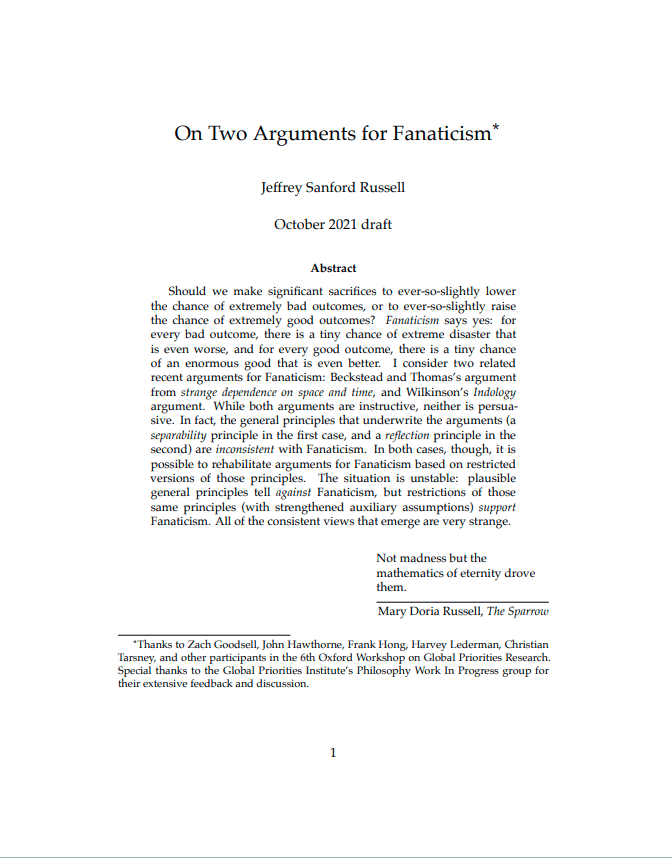On two arguments for Fanaticism
Jeffrey Sanford Russell (University of Southern California)
GPI Working Paper No. 17-2021, published in Noûs
Should we make significant sacrifices to ever-so-slightly lower the chance of extremely bad outcomes, or to ever-so-slightly raise the chance of extremely good outcomes? Fanaticism says yes: for every bad outcome, there is a tiny chance of extreme disaster that is even worse, and for every good outcome, there is a tiny chance of an enormous good that is even better. I consider two related recent arguments for Fanaticism: Beckstead and Thomas’s argument from strange dependence on space and time, and Wilkinson’s Indology argument. While both arguments are instructive, neither is persuasive. In fact, the general principles that underwrite the arguments (a separability principle in the first case, and a reflection principle in the second) are inconsistent with Fanaticism. In both cases, though, it is possible to rehabilitate arguments for Fanaticism based on restricted versions of those principles. The situation is unstable: plausible general principles tell against Fanaticism, but restrictions of those same principles (with strengthened auxiliary assumptions) support Fanaticism. All of the consistent views that emerge are very strange.
Other working papers
Consequentialism, Cluelessness, Clumsiness, and Counterfactuals – Alan Hájek (Australian National University)
According to a standard statement of objective consequentialism, a morally right action is one that has the best consequences. More generally, given a choice between two actions, one is morally better than the other just in case the consequences of the former action are better than those of the latter. (These are not just the immediate consequences of the actions, but the long-term consequences, perhaps until the end of history.) This account glides easily off the tongue—so easily that…
Can an evidentialist be risk-averse? – Hayden Wilkinson (Global Priorities Institute, University of Oxford)
Two key questions of normative decision theory are: 1) whether the probabilities relevant to decision theory are evidential or causal; and 2) whether agents should be risk-neutral, and so maximise the expected value of the outcome, or instead risk-averse (or otherwise sensitive to risk). These questions are typically thought to be independent – that our answer to one bears little on our answer to the other. …
Maximal cluelessness – Andreas Mogensen (Global Priorities Institute, Oxford University)
I argue that many of the priority rankings that have been proposed by effective altruists seem to be in tension with apparently reasonable assumptions about the rational pursuit of our aims in the face of uncertainty. The particular issue on which I focus arises from recognition of the overwhelming importance…

